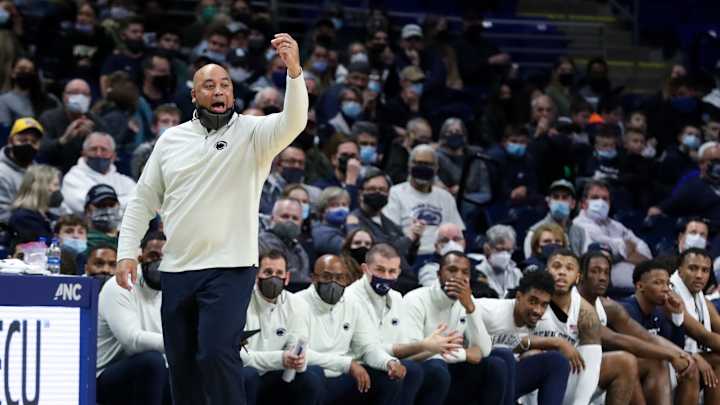Penn State's Micah Shrewsberry Has More to Sell Than NIL

In this story:
Micah Shrewsberry's first year as Penn State men's basketball coach coincided with the first year players could make money from Name, Image and Likeness opportunities. Shrewsberry lauds the concept behind NIL but retains some reservations, particularly regarding players who make it their first priority.
"If you come in and your first question is, 'What's your NIL package?' that's not going to fly with me," Shrewsberry said.
Shrewsberry met with reporters this week in State College for an offseason update on the Nittany Lions, who welcomed five freshmen and three transfers to a changing roster. Shrewsberry's first season went about as well as expected. The Lions finished 14-17 but lost eight Big Ten games by seven points or less, underscoring their commitment to playing under Shrewsberry's new system.
While navigating his first season as a Big Ten head coach, a series of post-2020 transfers and a COVID shutdown, Shrewsberry also had carve out time to learn about NIL and its effects on recruiting and roster management.
It hasn't been easy, but Shrewsberry said that Penn State's athletic administration and his basketball staff have devised creative methods to turn NIL opportunities into an asset. However, Shrewsberry acknowledged that the Big Ten has lagged behind another major conference in the NIL marketplace.
"I talk to a lot of my associates in the Big Ten, fellow coaches, and I feel like a lot of them feel like they’re behind as well," Shrewsberry said. "I think everybody’s behind the SEC in terms of what they’re doing on the basketball side. Probably on the football side as well. For us, it’s all about figuring it out quickly."
But figuring out NIL doesn't mean making it the program's focus. Shrewsberry noted that he's "all for college students being paid" through NIL deals, particularly considering the contributions and sacrifices they make. For instance, Shrewsberry still expects his players to attend class the day after playing a 9 p.m. road game at Nebraska.
A point comes, however, when focusing on NIL opportunities is counterproductive, Shrewsberry said. That's when it impedes the fit between player and program.
"The one thing that I’m not going out and selling to recruits is, 'If you come here, this is how much money you can make,'" Shrewsberry said. "If that’s No. 1 on your priority list, you’re probably not going to be a great fit here. You're probably not going to be a great fit at Penn State, you're probably not going to be a great fit for me."
So what is Shrewsberry selling?
"At the end of the day, I think we can help you become a better player," he said. "I think we can help put you in a position to make a lot of real money playing pro basketball in terms of how we do player development, in terms of how we play the game and how it translates to the next level. Those are the advantages that we have.
"[Our] years spent with pro teams as a staff has to be up there with other teams in the country. If that’s your goal, we can help you do it and we have a plan for you to do it."
Making the Bryce Jordan Center more intimidating
Penn State in June announced plans to reconfigure basketball seating at the Bryce Jordan Center, relocating the student section behind the benches in an effort to create a louder home environment. After coaching across the Big Ten last year, Shrewsberry loves the idea.
"I know when I stand out there at Illinois or Ohio State or Michigan or somewhere like that, those kids are back there nonstop," Shrewsberry said. "And at some point you’re like, 'Either this clock has got to go off or somebody has got to shut up.' It just takes your focus off what you’re doing for a little bit of time, and that’s all we’re trying to do.
"We have great fans and loyal season-ticket holders who have been here for a long time and we have great students. Our student support last year was awesome as well. So we want to make it the best for both. If those students can move to the other side and just create an advantage for us by just being loud, just being boisterous but also being on their feet and kind of urging the other people to get up and do the same thing with them, that’s all we’re trying to do. I hope it works for us great here."
Read More
'You can win in basketball,' at Penn State, new athletic director Patrick Kraft says
How Penn State plans to make the Bryce Jordan Center more intimidating
From tragedy, former Penn State linebacker Brandon Short is working to build a better tomorrow

Mark Wogenrich is the editor and publisher of Penn State on SI, the site for Nittany Lions sports on the Sports Illustrated network. He has covered Penn State sports for more than two decades across three coaching staffs, three Rose Bowls and one College Football Playoff appearance.